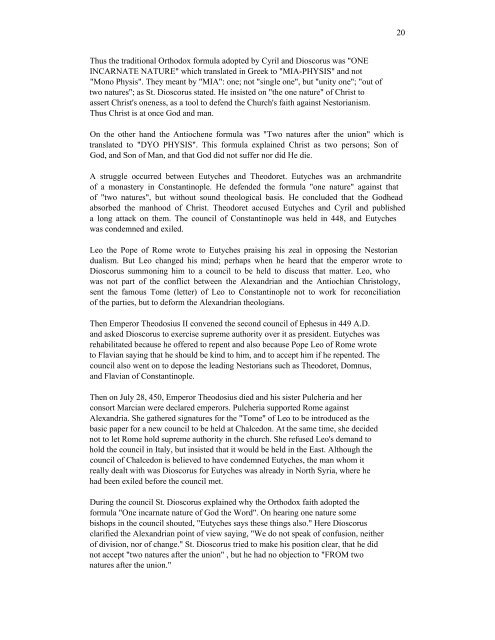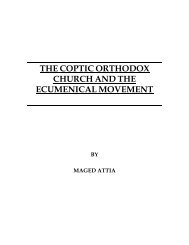Coptic interpretations of the Fourth Ecumenical Council - Saint Mina ...
Coptic interpretations of the Fourth Ecumenical Council - Saint Mina ...
Coptic interpretations of the Fourth Ecumenical Council - Saint Mina ...
Create successful ePaper yourself
Turn your PDF publications into a flip-book with our unique Google optimized e-Paper software.
Thus <strong>the</strong> traditional Orthodox formula adopted by Cyril and Dioscorus was "ONE<br />
INCARNATE NATURE" which translated in Greek to "MIA-PHYSIS" and not<br />
"Mono Physis". They meant by "MIA": one; not "single one", but "unity one"; "out <strong>of</strong><br />
two natures"; as St. Dioscorus stated. He insisted on "<strong>the</strong> one nature" <strong>of</strong> Christ to<br />
assert Christ's oneness, as a tool to defend <strong>the</strong> Church's faith against Nestorianism.<br />
Thus Christ is at once God and man.<br />
On <strong>the</strong> o<strong>the</strong>r hand <strong>the</strong> Antiochene formula was "Two natures after <strong>the</strong> union" which is<br />
translated to "DYO PHYSIS". This formula explained Christ as two persons; Son <strong>of</strong><br />
God, and Son <strong>of</strong> Man, and that God did not suffer nor did He die.<br />
A struggle occurred between Eutyches and Theodoret. Eutyches was an archmandrite<br />
<strong>of</strong> a monastery in Constantinople. He defended <strong>the</strong> formula "one nature" against that<br />
<strong>of</strong> "two natures", but without sound <strong>the</strong>ological basis. He concluded that <strong>the</strong> Godhead<br />
absorbed <strong>the</strong> manhood <strong>of</strong> Christ. Theodoret accused Eutyches and Cyril and published<br />
a long attack on <strong>the</strong>m. The council <strong>of</strong> Constantinople was held in 448, and Eutyches<br />
was condemned and exiled.<br />
Leo <strong>the</strong> Pope <strong>of</strong> Rome wrote to Eutyches praising his zeal in opposing <strong>the</strong> Nestorian<br />
dualism. But Leo changed his mind; perhaps when he heard that <strong>the</strong> emperor wrote to<br />
Dioscorus summoning him to a council to be held to discuss that matter. Leo, who<br />
was not part <strong>of</strong> <strong>the</strong> conflict between <strong>the</strong> Alexandrian and <strong>the</strong> Antiochian Christology,<br />
sent <strong>the</strong> famous Tome (letter) <strong>of</strong> Leo to Constantinople not to work for reconciliation<br />
<strong>of</strong> <strong>the</strong> parties, but to deform <strong>the</strong> Alexandrian <strong>the</strong>ologians.<br />
Then Emperor Theodosius II convened <strong>the</strong> second council <strong>of</strong> Ephesus in 449 A.D.<br />
and asked Dioscorus to exercise supreme authority over it as president. Eutyches was<br />
rehabilitated because he <strong>of</strong>fered to repent and also because Pope Leo <strong>of</strong> Rome wrote<br />
to Flavian saying that he should be kind to him, and to accept him if he repented. The<br />
council also went on to depose <strong>the</strong> leading Nestorians such as Theodoret, Domnus,<br />
and Flavian <strong>of</strong> Constantinople.<br />
Then on July 28, 450, Emperor Theodosius died and his sister Pulcheria and her<br />
consort Marcian were declared emperors. Pulcheria supported Rome against<br />
Alexandria. She ga<strong>the</strong>red signatures for <strong>the</strong> "Tome" <strong>of</strong> Leo to be introduced as <strong>the</strong><br />
basic paper for a new council to be held at Chalcedon. At <strong>the</strong> same time, she decided<br />
not to let Rome hold supreme authority in <strong>the</strong> church. She refused Leo's demand to<br />
hold <strong>the</strong> council in Italy, but insisted that it would be held in <strong>the</strong> East. Although <strong>the</strong><br />
council <strong>of</strong> Chalcedon is believed to have condemned Eutyches, <strong>the</strong> man whom it<br />
really dealt with was Dioscorus for Eutyches was already in North Syria, where he<br />
had been exiled before <strong>the</strong> council met.<br />
During <strong>the</strong> council St. Dioscorus explained why <strong>the</strong> Orthodox faith adopted <strong>the</strong><br />
formula "One incarnate nature <strong>of</strong> God <strong>the</strong> Word". On hearing one nature some<br />
bishops in <strong>the</strong> council shouted, "Eutyches says <strong>the</strong>se things also." Here Dioscorus<br />
clarified <strong>the</strong> Alexandrian point <strong>of</strong> view saying, "We do not speak <strong>of</strong> confusion, nei<strong>the</strong>r<br />
<strong>of</strong> division, nor <strong>of</strong> change." St. Dioscorus tried to make his position clear, that he did<br />
not accept "two natures after <strong>the</strong> union" , but he had no objection to "FROM two<br />
natures after <strong>the</strong> union."<br />
20








